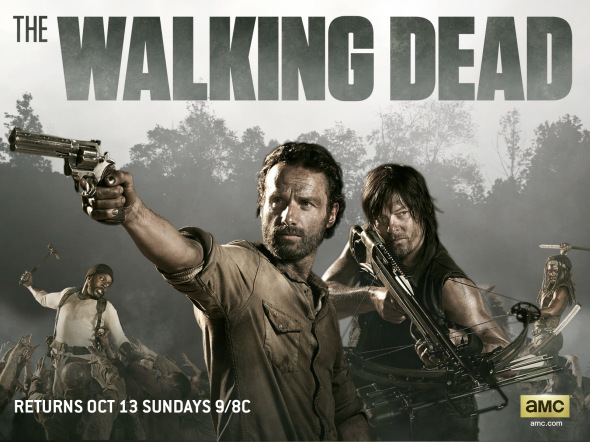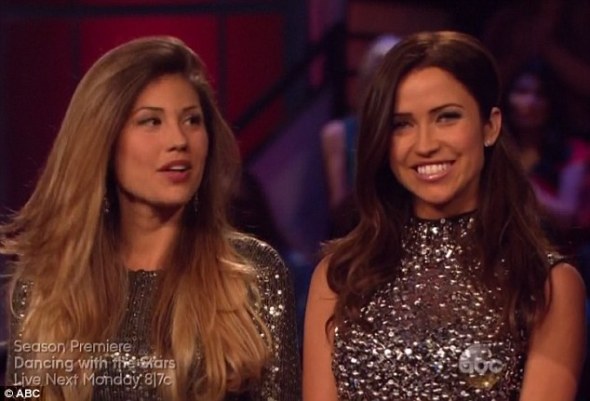In the news|July 10, 2015 09:28 EDT
Are Christians Being Mocked by Television Writers? New Programs Offer Morally Irresponsible and Darker Plots
It's been a refrain so oft-repeated that it borders on cliche; Christians feeling personally offended by the plots they see portrayed on television. However, as new programs become progressively darker, with less focus on uplifting the viewer and more exploration of moral ambiguity, it appears that perhaps the Christian viewing audience has a point.
With television that glories in sexual exploitation ("Game of Thrones"), demonic presences ("True Detective") and unapologetic gore ("The Walking Dead"), it's hard not to compare the shows that bring in high ratings and awards today to shows written in a similar vein just a few years earlier. Are American audiences being subjected to an endless stream of entertainment that ignores, caricatures, and at times outright mocks Christianity? Read through these examples of shows that depict the same genre and audience, but written just a few years apart, and decide for yourself.
Example #1: Family Drama
7th Heaven's The Camdens (1996-2007) vs. Parenthood's The Bravermans (2010-2015)
In its eleven-year run, '7th Heaven' held the title of champion in the genre of family drama. Featuring the trials and travails of a pastor and his brood as the premise, the show sometimes felt more like an after-school special than a highly rated primetime drama. Matt, Lucy, Simon, Mary and Ruthie stumbled through various moral dilemmas under the watchful eye of parents Eric and Annie Camden, facing punishment when they did the wrong thing and praise when they managed to figure something out on their own. Although at times a bit cheesy, the message of preserving family relationships and traditional values rang true for many and the show managed to perform well year after year. The Camdens often went out of their way to help parishioners, classmates, teachers and even strangers, managing to be both blithely clueless and paragons of virtue at the same time. The lessons of kindness, honesty and true commitment seemed to figure in to every episode - even the ones where Jessica Biel makes out with Andrew Keegan.
In contrast, the critically acclaimed and widely beloved 'Parenthood' series focused on four adult siblings struggling to navigate their relationships. While the Bravermans, particularly protaganist Adam Braverman, are also presented as virtuous stalwarts and protectors of all that is good, there are some troublesome moral ideas at play in every episode -- to say the least. For example, while long-suffering husband of Julia Braverman, Joel, does everything he can to make his capricious and ambitious wife happy, he is often construed on the show as weak, easily undermined, a workaholic, and is ultimately cheated on by Julia -- a situation Julia altogether blames Joel for. Hapless, exhausted single mom Sarah Braverman is continually engaging in unwise romantic entanglements, has trouble separating her work life from her professional life, takes ruthless advantage of her brother Adam and then has the audacity to be confused by her daughter Amber's wild-child ways. Pre-marital sex, gay relationships and marital infidelity abound in terms of storyline.
While it may be entertaining, the plot of 'Parenthood' does nothing to address the ultimate questions of morality and consequences. Even toward the end of the series, when a main character faces a terminal illness, the questions that are asked relate to what will happen to the remaining characters' lives if that one dies. Themes of indulgence, selfish ambition and a sense of hyper-political correctness run rampant and are never discouraged or even addressed. In this way, 'Parenthood' is a perfect example of the way that the modern family is expected to present themselves: rapidly flitting about from feeling to feeling. The Bravermans are disjointed, conflict- avoidant even to the end, and utterly vapid.
Example #2: Political Drama
Jed Bartlett ('The West Wing', 1999-2006) vs Francis Underwood ('House of Cards', 2013- present)
'House of Cards'
Here is a classic example of the way that entertainment, and our culture in general, has become obsessed with darkness and manipulation in recent years. While 'The West Wing', starring Martin Sheen, was deemed a slightly twisted take on the way that decisions are made in the White House when it first aired, 'The West Wing' is an airy romp compared to Netflix's original series, 'House of Cards', which has taken off like wildfire since its debut. Comparisons between the two shows are inevitable, but the contrast between them is especially stark when examining the spiritual themes contained within.
President Jed Bartlett is a strong Catholic. He's devoted to his country, his political party, and his family. Though at times idealistic, Jed Bartlett believes in leadership through compromise. He is by no means presented as a transparent character, and the machinations that go on behind the scenes at the White House are often Machiavellian as Bartlett's press secretary, aides and advisors work as a team to stave off wars, placate the press, and create the illusion that the Oval Office is an all-powerful place. A well-remembered episode is that which centers around the death of a beloved supporting character, in which President Bartlett contemplates his own mortality. The sense that all power is fleeting and life is a temporary state of being flies through the poetic language, some of writer Aaron Sorkin's best dialogue.
While the problems that the characters create for themselves do often focus on personal shortcomings and sexual foibles, viewers get the feeling that these characters are supposed to mess up; when they do, they pay a price, and they try to become better. Watching this show now opens up an interesting narrative into today's politics, too; while at the time Jed Bartlett was written as a socially liberal president, he now comes across at times as only moderate, sometimes even downright conservative with his viewpoints in the context of today's political landscape.
Which brings us to the characters of Francis Underwood and his wife, Claire Underwood. Frank is shown to be cruel, conniving, absolutely ruthless -- and he is the hero of the show. Claire is portrayed as cold, withdrawn, and manipulative herself, which makes them the perfect match in this dark telling of a couple's rise to power. While murder and deceit are arguably the main themes of the show, Christian viewers might still be able to enjoy it if it were not for the shocking sex scenes and exploitative storylines that target young women in particular. In the Underwood's Washington, all kindness is seen as weakness, and any weakness is deserving of shame. While they take turns at being both charming and obtuse toward each other, even the relationship between Frank and Claire is horrifying in its baseness. It is clear that neither one of them have any interest in a higher morality or fear of God.
Example #3:Sci-Fi
LOST (2004-2010) vs. The Walking Dead (2010 - present)

"The Walking Dead' Season 6 banner
It may seem at first like a strange comparison, but the way that the doomed citizens of 'LOST' 's mysterious island banded together to fight against elements known and unknown brings to mind AMC's smash hit zombie thriller. Where 'LOST' was one of the first television shows that viewers watched "together" through use of social media and blog fandoms, 'The Walking Dead' inspires a similar desire in their frenetic fan base, with an interactive app that streams original content during episodes that air and a special show afterward that discusses plot points and interviews actors. Both shows also rely heavily on elements of suspense, science fiction, and a creating a surreal alternate reality in which any character could be killed off at any time.
'LOST' played into that alternate reality by introducing a "spiritualism" that inhabited the island, which took on a character all its own. While many fans found the ending to be totally dissatisfying (a conversation for another time), the finale did manage to concoct a way to thread that spiritualism to a sensical and solid conclusion. Ideas of heaven, hell, purgatory and the afterlife in general where spun together seamlessly with the present-world emotions of guilt, fear, identity and love that the characters felt. One could even argue that the most successfully communicated idea on 'LOST' was the story of redemption: Though Jack, Kate, Sawyer, Sun, Hurley and the rest were something worthy of death and destruction, they were preserved. They lived another story. In one way or another, they were rescued.
Christian characters on 'LOST' included a priest named Mr. Eko, and a couple named Rose and Bernard. Mr. Eko builds a church on a remote part of the island as a memorial to the God who redeemed him from his previous life as a drug dealer. Rose and Bernard give thanks to God for His miraculous provision in healing Rose from her cancer, and they are presented as being a steadfast example of fidelity and true love. In 'LOST', blind faith is criticized (see: John Locke), but transformative faith is applauded.
Alternatively, 'The Walking Dead' presents an altogether different picture of our ultimate fate. There is an unavoidable theme of resurrection in the 'walkers'/zombies that loom as the biggest threat to Rick's band of survivors. But the resurrection that happens on 'The Walking Dead' brings people back into a life of darkness where they are consumed by hunger and unknown to their former selves. In 'The Walking Dead', all are carriers of this zombie affliction. To live is to live in fear of death, and what comes after death. To die is to live all over again as a terror to all who remain alive.
As Rick & co. scheme to stay alive in the face of unspeakable odds, the characters slowly lose their conscience about what they must do to keep from being killed. The show's most prominent Christian character, Herschel, puts the whole group in danger by refusing to kill his zombie-fied family members, seeing it as murder. Herschel is selfless and brave, devoted to his daughters and still carrying his Bible throughout his tenure on the show. But Herschel is also seen as weak, naive, and ultimately, disposable. 'The Walking Dead' characters openly discuss what is for the most part their lack of faith and general hopelessness. There is no afterlife to hope for, and no reward for acting as a peacemaker. There is a clamoring, always, for survival -- but no rationale as to why one might want to survive.
Example #4: Reality TV
The Bachelorette (Trista's season, 2003) vs. The Bachelorette (Kaitlyn's season, 2015)

Britt Nilsson and Kaitlyn Bristowe.
While "reality" television would appear to be less susceptible to scripted undertones that slant Christianity, it's a well-documented fact that TV dating shows such as 'The Bachelor' are as carefully plotted and edited as any scripted drama (see: Lifetime's original series UnREAL for a fictionalized glimpse of what goes on behind the scenes.) However, the show that started out as a quest to find one's soulmate has continually devolved into an unabashed shock-fest.
On this season of 'The Bachelorette', the season lead Kaitlyn is seen making out with suitor after suitor and even has sex with one contestant on the very first date. Edgy Kaitlyn Bristowe believes that in order to "explore other relationships", having sex is just part of the process. The formula that 'The Bachelor' has used for years has involved leads meeting potential mate's family's before proceeding to a 'fantasy suite' date night in which intimacy was one of the possible scenarious inferred. However, for the most part, this 'off-camera' time between people on the show was cut with discretion so that any physicality that happened between the contestants was purely speculative. Not so on Kaitlyn's season -- she is seen the morning after the 'fantasy suite' date night having breakfast with contestant Nick, wearing a robe, in a suggestive position that more than confirms what viewers already assumed was going to go on between the two of them. Clearly ABC is looking to push the envelope with how racy they want the show to be.
The original 'Bachelorette', Trista Rehn Sutter, even revealed that she believes the show was 'a little more innocent' when she was the lead, claimed she only kissed three of her potential suitors on the whirlwind dating show. While it may not have been acceptable to show a woman making certain decisions on national television when Trista's show aired, it is certainly a no-holds-barred environment, now. Contestants are also often seen so inebriated that they have to be asked to leave, or become so drunk that they are easily coerced into drunken confrontations with each other.
While it's true that storylines with darker elements have been hitting the small screen since the mid-1990s, one might argue that there has never been a more prevalent time for them on television than right now.












